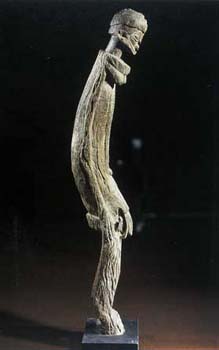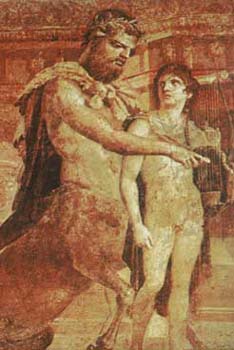
One of the Nommo, androgynous water spirit and mythic ancestor of the Dogon people, Africa
Salmon school up in small bays in the inlet, waiting for a rain. They have traveled halfway around the world since they were born in the gravel four-hundred miles upriver. Now they are back at the river mouth, and as soon as the rain comes they begin their incredible journey. Fighting against the current, they climb waterfalls and hurl themselves over rocks. Riding backeddies, resting in deep wells, exhausted and torn to shreds, they swim to their spawning ground.
Many die. Predators gather at the river, feasting bounteously. But all who live keep swimming against the current, going home.
Queer people are called to a journey like this. Like the salmon, we must go home, even when home seems impossible. Drawn irrevocably by our inner compass, listening only to our inmost images and instincts, we undertake this journey, almost hopeless against all odds. On the way, we need courage, faith, resilience, and plenty of luck. So many are destroyed. Yet age after age, perversely, we come home. We die, we are murdered, and yet we continually reconstitute the web of life. Swimming upstream, we are nevertheless the spirit of the river, its most telling inhabitant. Without our spawn, skeletons and skins, without our brilliant colors and our impossible journey, the river is emptied of magic and meaning. Like a salmon, or a shaman, each queer person leaves the realm of common sense to undertake a tortuous quest and a transformation: the journey with ecstasy – or Death – at its end and a return to life as its re-beginning. We come back with gifts. Perhaps we carry the capacity to speak with Death and the afterlife, with animal spirits and with gods.
Hilary Stewart describes the “First Salmon Ceremony” by which the Salish people at Saanich welcomed the salmon returning to the river. Children all carried a salmon, holding the dorsal fin in their teeth. They stroked and soothed the fish as they traveled in a procession up from the water to the cooking fire, while the Ritualist sang thanks to the salmon.[i]
Severed from nature and the mythic dimensions of being, contemporary society would have it that salmon comes in tins. Without a sense of nature’s generosity and power, people can grow materialistic and cynical. Even their dreams could stay individualistic and small – if it were not for the existence of GLBTQ people. We are the ones who dare depart the safe confines of a predictable life, and venture into a dangerous unknown. Our goal cannot be personal aggrandizement or social approval. We each move instead to grasp and live the fabulous wonder of an inborn self. Becoming queer means harkening to the gods’ will, despite doubt and fear, in the face of innumerable obstacles. We swim upstream, impossible distances, against the odds, with only our inmost impulses to guide us. The incredible journey – to self-knowledge, to love and community – stands in drastic contrast to souls sunk in cynicism, rotting with surfeit, cowering in fear of imagined perils.

Chiron with Achilles, wall painting, Ancient Greece.
In a society without conscious myths, rites and sacraments to conjure the sacred and guide the soul to its calling, queer identity carries enormous power. GLBTQ people live the story of the hero. We each embody the archetypal pattern of the singular individual who, with improbable courage, finds and creates a home in a hostile world. There is an essential generosity, a call to community, in our story. Tyranny – including the tyranny of what is ordinary, expected, possible, and easy – overtakes any place without heroes to inspire rebellion.[ii] Queer people are icons to all who would dare to risk despair for the sake of freedom. We make a place in the world for mythic struggle and transformation, when we endure punishment for the dream of love.
[i] Hilary Stewart, 1977, (168).
[ii] This idea originates with Rollo May, 1991


